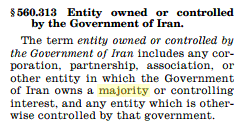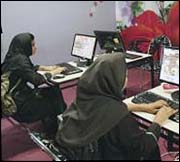 Well, even the White House now knows, and presumably the folks at the Office of Foreign Assets Control now know, that the Syrian dictator with the silly moustache, Bashar al-Assad, was possibly circumventing U.S. sanctions when he downloaded from iTunes such musical masterpieces as “Dont Talk Just Kiss” by Right Said Fred and God Gave Me You by Blake Shelton. (Click links to these songs at your own risk; Export Law Blog is not liable for any claims of intentional infliction of emotional distress by readers who actually click these links and view the official videos for the songs involved.) Yesterday, White House press secretary Jay Carney called the downloads “sickening” which was less a justifiable commentary on al-Assad’s musical tastes than it was a criticism of al-Assad using popular songs as the personal soundtrack to his slaughter of dissidents in Syria.
Well, even the White House now knows, and presumably the folks at the Office of Foreign Assets Control now know, that the Syrian dictator with the silly moustache, Bashar al-Assad, was possibly circumventing U.S. sanctions when he downloaded from iTunes such musical masterpieces as “Dont Talk Just Kiss” by Right Said Fred and God Gave Me You by Blake Shelton. (Click links to these songs at your own risk; Export Law Blog is not liable for any claims of intentional infliction of emotional distress by readers who actually click these links and view the official videos for the songs involved.) Yesterday, White House press secretary Jay Carney called the downloads “sickening” which was less a justifiable commentary on al-Assad’s musical tastes than it was a criticism of al-Assad using popular songs as the personal soundtrack to his slaughter of dissidents in Syria.
How did he get away with this in the face of U.S. sanctions? According to the Guardian story which broke this news:
The fact that the US last year imposed sanctions against Assad and other Syrian government officials, prohibiting “US persons” from engaging in transactions with them, may explain why Assad’s iTunes account is registered to another name and a New York address.
But do U.S. sanctions really prohibit these downloads? Section 542.206 of the Syrian Sanctions Regulations permit export of informational materials to Syria. And even if the executive order designating al-Assad as a blocked person is not subject to the exemption in 542.206, doesn’t the Berman Amendment, 50 U.S.C. 1702(b)(3), which protects informational materials, permit these downloads? Certainly that was the intent of the Berman Amendment but a narrow reading might exclude informational transfers to blocked parties. The Berman Amendment prohibits the president from regulating “exportation to any country” of informational materials, but here the regulation prohibits the exportation to a particular person without respect to the country in which that person is located.
Assuming, for a moment, that the export of informational material to al-Assad is illegal, this case would further illustrate the difficulty of complying with U.S. economic sanctions laws in cyberspace. In theory, a violation of the Executive Order designating al-Assad doesn’t require knowledge by the violator that he or she is dealing with al-Assad. Even if al-Assad is hiding behind a fake name and address, dealings with him are still illegal under the literal language of the order and section 1705 of the International Emergency Economic Powers Act which makes violations of the order illegal. But what could Apple or anyone else done here to prevent the violation? Require every iTunes download account to be verified by presenting a photo ID in person at an Apple store?
On a related sanctions matter, I yesterday expressed my displeasure at the inevitable appearance of the wretched eCFR on the OFAC site. The only real advantage is that the regulations might be more readily updated. But no. Yesterday, OFAC amended the Iran regulations to change the definition of an entity owned or controlled by the Government of Iran. Under the old rule, an entity was owned or controlled by the Government of Iran if the Government of Iran “owns a majority or a controlling interest.” Under the new rule, the entity is deemed to be controlled by the Government of Iran if that government “owns a 50 percent or greater interest or a controlling interest.” Guess which version the OFAC website eCFR version of the rules shows?

As the kids on the web these days are wont to say: FAIL.
 In the last release of civil penalty information, the Office of Foreign Assets Control (“OFAC”) announced that it whacked Essie Cosmetics Ltd. with a whopping $450,000 fine for exports the company made to Iran in violation of the U.S. embargo on Iran. So what did Essie export to merit such an enormous fine? Uranium enrichment centrifuges? Missile guidance systems? No. Nail polish. Yes, you read that correctly: nail polish
In the last release of civil penalty information, the Office of Foreign Assets Control (“OFAC”) announced that it whacked Essie Cosmetics Ltd. with a whopping $450,000 fine for exports the company made to Iran in violation of the U.S. embargo on Iran. So what did Essie export to merit such an enormous fine? Uranium enrichment centrifuges? Missile guidance systems? No. Nail polish. Yes, you read that correctly: nail polish
 Posted by
Posted by  Category:
Category: 

 This blog
This blog  A number of news reports, like
A number of news reports, like  Well, even the White House now knows, and presumably the folks at the Office of Foreign Assets Control now know, that the Syrian dictator with the silly moustache, Bashar al-Assad, was possibly circumventing U.S. sanctions when he
Well, even the White House now knows, and presumably the folks at the Office of Foreign Assets Control now know, that the Syrian dictator with the silly moustache, Bashar al-Assad, was possibly circumventing U.S. sanctions when he 


